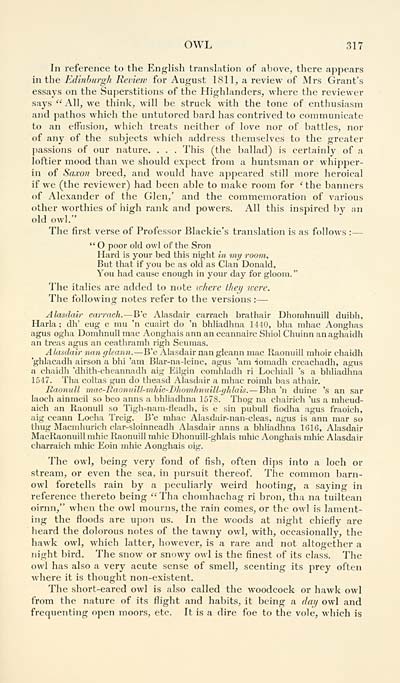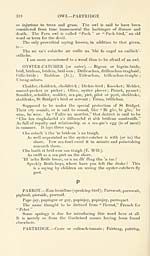Download files
Complete book:
Individual page:
Thumbnail gallery: Grid view | List view

OWL 317
In reference to the En<yli.sli translation of above, there appears
in the Edinburgh Rcvie?i! for Aucvust ISll, a review of iMrs Grant's
essays on the Superstitions of the Highlanders, wliere the reviewer
says " All, we think, will be struck with the tone of enthusiasm
and pathos which the untutored bard has contrived to communicate
to an effusion, which treats neither of love nor of battles, nor
of any of the subjects which address themselves to the greater
passions of our nature. . . . This (the ballad) is certainly of a
loftier mood than we should expect from a huntsman or whipper-
in of Sci.von breed, and would have appeared still more heroical
if we (the reviewer) had been able to make room for 'the banners
of Alexander of the Glen,' and the commemoration of various
other worthies of high rank and powers. All this inspired by an
old owl."
The first verse of Professor Blackie's translation is as follows : —
" O poor old owl of the Sron
Hard is your bed this night in my room.
But that if you be as old as Clan Donald,
You had cause enough in your day for gloom."
The italics are added to note where Iheij tcere.
The following notes refer to the versions : —
Alasdair carrach. — B'e Alasdair carrach brathair Dhomhnuill duibh,
Harla ; dh' eug e mu 'n cuairt do 'n bhliadhna 1440, bha mhac Aonghas
agus ogha Domhnull mac Aonghais ann an ceannairc Shiol Chuinn an aghaidh
an treas agus an ceathramh righ Seumas.
Alasdair 7ian gleann. — B'e Alasdair nan gleann mac Raonuill mhoir chaidh
'ghlacadh airson a bhi 'am Blar-na-Ieine, agus 'am -iomadh creachadh, agus
a chaidh 'dhith-cheannadh aig Eilgin comhiadh ri Lochiall 's a bhliadhna
1547. Tha coltas gun do theasd Alasdair a mhac roimh bas athair.
Raonull 7nac-Iiaomiilf-mhic-DJiomJnmill-ffhlais. — Bha 'n duine 's an sar
laoch ainmeil so beo anns a bhliadhna 1578. Thog na chairich 'us a mheud-
aich an Raonull so Tigh-nam-fleadh, is e sin pubull fiodha agus fraoich,
aig ceann Locha Treig. B'e mhac Alasdair-nan-cleas, agus is ann mar so
thug Macmhurich clar-sloinneadh Alasdair anns a bhliadhna 1616, Alasdair
MacRaonuill mhic Raonuill mhic Dhonuill-ghlais mhic Aonghais mhic Alasdair
charraich mhic Eoin mhic Aonghais oig.
The owl, being very fond of fish, often dips into a loch or
stream, or even the sea, in pursuit thereof. The common barn-
owl foretells rain by a peculiarly weird hooting, a saying in
reference thereto being " Tha chomhachag ri bron, tha na tuiltean
oirnn," when the owl mourns, the rain comes, or the owl is lament-
ing the floods are upo7i us. In the woods at night chiefly are
heard the dolorous notes of the tawny owl, with, occasionally, the
hawk owl, which latter, however, is a rare and not altogether a
night bird. The snow or snowy owl is the finest of its class. The
owl has also a very acute sense of smell, scenting its prey often
where it is thought non-existent.
The short-eared owl is also called the woodcock or hawk owl
from the nature of its flight and habits, it being a daj/ owl and
frequenting open moors, etc. It is a dire foe to the vole, which is
In reference to the En<yli.sli translation of above, there appears
in the Edinburgh Rcvie?i! for Aucvust ISll, a review of iMrs Grant's
essays on the Superstitions of the Highlanders, wliere the reviewer
says " All, we think, will be struck with the tone of enthusiasm
and pathos which the untutored bard has contrived to communicate
to an effusion, which treats neither of love nor of battles, nor
of any of the subjects which address themselves to the greater
passions of our nature. . . . This (the ballad) is certainly of a
loftier mood than we should expect from a huntsman or whipper-
in of Sci.von breed, and would have appeared still more heroical
if we (the reviewer) had been able to make room for 'the banners
of Alexander of the Glen,' and the commemoration of various
other worthies of high rank and powers. All this inspired by an
old owl."
The first verse of Professor Blackie's translation is as follows : —
" O poor old owl of the Sron
Hard is your bed this night in my room.
But that if you be as old as Clan Donald,
You had cause enough in your day for gloom."
The italics are added to note where Iheij tcere.
The following notes refer to the versions : —
Alasdair carrach. — B'e Alasdair carrach brathair Dhomhnuill duibh,
Harla ; dh' eug e mu 'n cuairt do 'n bhliadhna 1440, bha mhac Aonghas
agus ogha Domhnull mac Aonghais ann an ceannairc Shiol Chuinn an aghaidh
an treas agus an ceathramh righ Seumas.
Alasdair 7ian gleann. — B'e Alasdair nan gleann mac Raonuill mhoir chaidh
'ghlacadh airson a bhi 'am Blar-na-Ieine, agus 'am -iomadh creachadh, agus
a chaidh 'dhith-cheannadh aig Eilgin comhiadh ri Lochiall 's a bhliadhna
1547. Tha coltas gun do theasd Alasdair a mhac roimh bas athair.
Raonull 7nac-Iiaomiilf-mhic-DJiomJnmill-ffhlais. — Bha 'n duine 's an sar
laoch ainmeil so beo anns a bhliadhna 1578. Thog na chairich 'us a mheud-
aich an Raonull so Tigh-nam-fleadh, is e sin pubull fiodha agus fraoich,
aig ceann Locha Treig. B'e mhac Alasdair-nan-cleas, agus is ann mar so
thug Macmhurich clar-sloinneadh Alasdair anns a bhliadhna 1616, Alasdair
MacRaonuill mhic Raonuill mhic Dhonuill-ghlais mhic Aonghais mhic Alasdair
charraich mhic Eoin mhic Aonghais oig.
The owl, being very fond of fish, often dips into a loch or
stream, or even the sea, in pursuit thereof. The common barn-
owl foretells rain by a peculiarly weird hooting, a saying in
reference thereto being " Tha chomhachag ri bron, tha na tuiltean
oirnn," when the owl mourns, the rain comes, or the owl is lament-
ing the floods are upo7i us. In the woods at night chiefly are
heard the dolorous notes of the tawny owl, with, occasionally, the
hawk owl, which latter, however, is a rare and not altogether a
night bird. The snow or snowy owl is the finest of its class. The
owl has also a very acute sense of smell, scenting its prey often
where it is thought non-existent.
The short-eared owl is also called the woodcock or hawk owl
from the nature of its flight and habits, it being a daj/ owl and
frequenting open moors, etc. It is a dire foe to the vole, which is
Set display mode to: Large image | Transcription
Images and transcriptions on this page, including medium image downloads, may be used under the Creative Commons Attribution 4.0 International Licence unless otherwise stated. ![]()
| Early Gaelic Book Collections > Blair Collection > Gaelic names of beasts (mammalia), birds, fishes, insects, reptiles, etc > (343) |
|---|
| Permanent URL | https://digital.nls.uk/79333363 |
|---|
| Description | A selection of books from a collection of more than 500 titles, mostly on religious and literary topics. Also includes some material dealing with other Celtic languages and societies. Collection created towards the end of the 19th century by Lady Evelyn Stewart Murray. |
|---|
| Description | Selected items from five 'Special and Named Printed Collections'. Includes books in Gaelic and other Celtic languages, works about the Gaels, their languages, literature, culture and history. |
|---|

